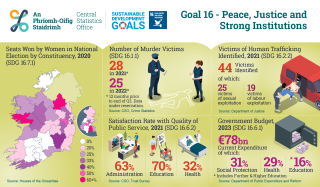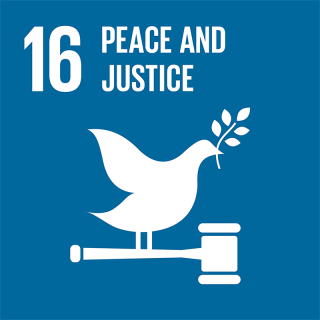SDG Goal 16 - Peace, Justice and Strong Institutions

The Central Statistics Office (CSO) recently published a report on Irish data relating to the United Nations Sustainable Development Goals (SDGs) – Goal 16 Peace, Justice and Strong Institutions for 2022. This new report has data on 24 indicators (however,national date was not available for all indicators) for Ireland, divided over five chapters:
Victims of Violence;
Access to Justice;
Corruption;
Institutional Framework;
Policy and Legislation.
Key Findings - Victims of Violence
In 2021, the murder rate per 100,000 population was 0.46, a decrease from the rate of 0.62 in 2020. The number of homicide victims fell from 84 in 2016 to 39 in 2021. There was also a decrease in the number of murder/manslaughter/infanticide victims, which decreased from 42 in 2016 to 24 in 2021. Deaths from dangerous driving fell from 42 in 2016 to 15 in 2021. Sexual offences increased by 5.6 per cent in the 12 month period up to Q2 2022 with an extra 187 incidents reported. The reported suspect was known to the victim in just over eight in ten (83 per cent ) recorded Sexual offences between Q3 2021 and Q3 2022. For Assaults, the reported suspect was known to the victim in three out of four (75 per cent) Assault offences. A partner or ex-partner was the reported suspect for just over a fifth (22 per cent) of such crimes, 14 per cent were a friend or acquaintance, and 13 per cent were a blood relative.
75 per cent of people aged 18 years and over said they felt “very safe” or “fairly safe” walking in their local area at night in the 12 months prior to interview. This feeling of safety was considerably lower for females (64 per cent) than for males (87 per cent). More than twice as many males than females reported feeling “very safe” (60 per cent compared to just 29 per cent).
There were 44 victims of human trafficking identified by An Garda Síochána in Ireland in 2021. Of these, 25 were victims of sexual exploitation and 19 were victims of labour exploitation. There were no victims identified trafficked for the purposes of forced criminality and there were no minor victims identified. This represents an increase of 6 identified victims from the 38 victims reported in respect of 2020. As was the case in previous years, in 2021 the majority of incidents of human-trafficking reported in Ireland relate to sexual exploitation.
Key Findings - Access to Justice
39 per cent of victims of personal crime reported to An Garda Síochána. Roughly two in five (39 per cent ) people aged 18 and over who said that they had been a victim of personal crime in the 12 months before the interview had reported to An Garda Síochána. There was considerable differences though in the level of reporting by different types of crime – people were most inclined to report incidents of violent thefts (67 per cent) and least likely to report fraud incidents (19 per cent).
Key Findings - Corruption
The World Bank Enterprise Survey data for Ireland shows that bribery incidences were only identified among medium size enterprises (those employing between 20-99), where 1.1 per cent of medium size enterprises had bribery incidences, in 2020. In the service sector, just 0.5 per cent of enterprises experienced bribery incidences in 2020, compared to none in the manufacturing sector. Data for 2020 shows 1.5 per cent of firms were expected to give gifts in meetings with tax officials. Also, 0.5 per cent of enterprises identified corruption as a major constraint.
Key Findings - Institutional Framework
One of the indicators in this section is Primary Government Expenditures as a Proportion of Original Approved Budget, by Sector. Budget 2023 set out overall gross voted expenditure for 2023 of €90,415 million and Local authority budgeted revenue (current) expenditure in 2022 was €6.3bn.
83 per cent of the population were satisfied with the service of civil service organisations and satisfaction levels with public services in 2021 were as follows: 70 per cent education, 63 per cent administration and 32 per cent health.
According to the Houses of the Oireachtas there were 531 candidates in the 2020 general election, of whom 162 were female. The proportion of female candidates varied widely across the constituencies in 2020. Half or more of the candidates were female in Kildare South, Dublin Central, Dublin South Central and Meath East. At the other end of the scale, less than 8 per cent were female in Cork East and Donegal. Women won 23 per cent of seats in the 2020 General Election, resulting in 36 women TDs, one more than the previous election. The highest percentage of women elected in a constituency was 67 per cent in Dublin Rathdown, while there were several constituencies with no women elected.
Persons with a disability accounted for 7.4 per cent of employees in public administration and defence, similar to the average of 7.7 per cent for all sectors.
At present 42 per cent of Irish judges are female. In the District Court, almost 44 per cent or 27 out of 62 are female. The Circuit Court has 42 per cent female representation. In the High Court, women constitute 38 per cent of the judges. In the Court of Appeal, 9 of the 17 judges are female equalling 53 per cent and in the Supreme Court the figure is 33 per cent.
Key Findings - Policy and Legislation
100 per cent of births are registered in Ireland.
The Irish Human Rights and Equality Commission Annual Report 2021 shows no incidence of verified cases of killing, kidnapping, enforced disappearance, arbitrary detention and torture of journalists, associated media personnel, trade unionists and human rights advocates in the previous 12 months in Ireland.
Under the Freedom Of Information Act, there is a right to:
- Access records held by a government department or certain public bodies;
- Request correction of personal information relating to you held by a government department or certain public bodies where it is inaccurate, incomplete or misleading;
- Obtain reasons for a decision made by a government department or certain public bodies where the decision affects you.
The highest rates of perceived discrimination in Q1 2019 were reported by Persons identifying as LGBTI+ (33.2 per cent); Persons from non-white ethnic backgrounds (33.1 per cent); Unemployed people (30.2 per cent); Non-Irish nationals (26.7 per cent) and people with a disability (24.1 per cent).

On Monday 20th February 2023, Social Justice Ireland released Measuring Progress: The Sustainable Progress Index 2023. This publication ranks 14 comparable EU countries based on their delivery of the UN’s Sustainable Development Goals (SDGs). Written by Prof. Charles M.A. Clark of St John’s University, NY; Dr. Catherine Kavanagh of UCC; and Colette Bennett of Social Justice Ireland, the index compares 14 EU countries across all UN SDGs, assesses their performance on each individual SDG; creates a ranking table for performance overall; and provides national and local-level policy proposals to improve Ireland's progress towards the Goals.
This SDG is at the top of the ranking in the EU as favourable trends on all the indicators have been observed, indicating that “life in the EU has become safer over the past few years”. To reflect and assess the theme of SDG16, we employ 8 different indicators. The theme of peace and personal security is captured by indicators of homicides, occurrence of crime/violence/vandalism, and feeling safe walking home. The theme of access to justice and strong institutions is measured by: an indicator of confidence in the judicial system (Eurostat); the perception of corruption (Transparency International); and the number of unsentenced detainees (as per cent of the population – an official UN indicator). Our analysis of SDG16 shows that Ireland is a relatively safe society with a low number of deaths associated with homicide or assault, and a lower 48 perceived occurrence of crime, violence and vandalism. Relative to the EU14 countries, Ireland’s overall score puts it in 7th place.
Policy Proposals
If we are to achieve many of the goals set out above, Social Justice Ireland believes that Government should:
Fully implement the recommendations of the Commission for the Elimination of Racial Discrimination within a reasonable timeframe.
Fully implement the recommendations of the 2019 Trafficking in Persons Report.
Adequately resource the Public Participation Network (PPN) structures for participation at Local Authority level and ensure capacity building is an integral part of the process.
Promote deliberative democracy and a process of inclusive social dialogue to ensure there is real and effective monitoring and impact assessment of policy development and implementation using an evidence-based approach at local and national level.
Resource an initiative to identify how a real participative civil society debate could be developed and maintained.
Ensure that the Legal Aid Board is adequately funded so that people in the court system are guaranteed equality of access to justice.
Include, in the Commission for Regulating Lobbying’s Annual Reports, policy areas with the greatest lobbying activity, the lobbying organisations and the designated public officials engaged so as to highlight to the general public those influencing the political decision-making process.